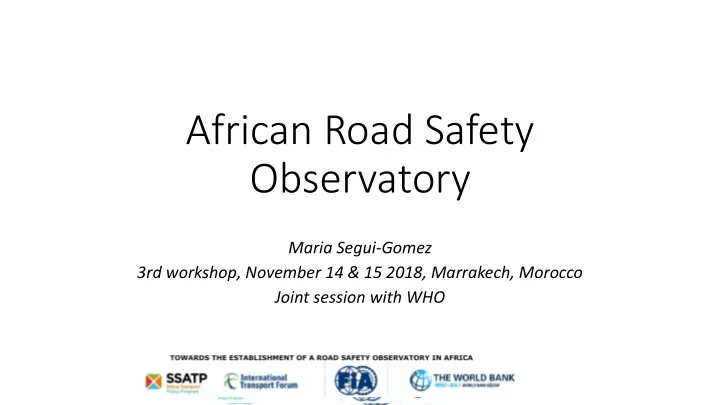

African Road Safety Observatory Maria Segui-Gomez 3rd workshop, November 14 & 15 2018, Marrakech, Morocco Joint session with WHO
• Rationale • Objective • Methodology • Why us
Rationale Magnitude of the problem and its trend • WHO´s 2003 neglected global epidemics: cardiovascular disease, tobacco, and road traffic injuries • 1.2 million deaths worldwide in 2016 • Africa´s road traffic deaths are 20% of all world´s deaths (despite only 2% vehicles) Road Traffic deaths represent 2.4% of all deaths worldwide. This is more than Malaria, TB, HIV and many others and comparable to Diabetes (As a reference, Ischemic Heart Disease • Bad projections Conditions (IHD) are 17.3%) Road Traffic deaths continue to be the 9th leading cause of death, a stable position since 1990
But, it that really the magnitude? Scarcity and complexity of data Year Police reports WHO global report figures GBD figures (in millions) 1990 Not compiled 1.12 2003 0.66 1.20 1.30 2011 0.64 1.24 1.36 2014 0.62 1.20 1.34 2016 Pending publication Pending publication in 1.34 November. 1.4 is the advanced 2020 N/A Projected 1.90 N/A
In some more detail (2014) Number of Total population Total reported road Total WHO road countries (000s) deaths by countries death counts 194 7 312 528 622 268 1 207 617 World (total) 49 1 001 415 63 830 242 772 Africa 35 986 707 127 645 138 361 Americas 30 4 112 685 322 066 694 817 Asia 43 733 385 56 220 59 406 Europe 23 439 973 50 713 69 157 North Africa and Western Asia Oceania 14 38 363 1 794 3 004
Explaining the differences Is there a civil (vital) registration Even when there is a civil registration system in place? system in place • More tan 40 countries out of 49 • Some countries do not cross- in previous slide have no check their data operational civil registration • E.g., Spain. 2012 was the first year systems reporting to WHO when traffic authorities established a protocol to periodically validate road deaths • (temporary) solution: againts civil registration system mathematical model for all causes of death
What do you do when you have almost four- fold differences? One of two choices 1) assume underreporting is random and continue policy making using police-derived data and its analysis 2) investigate the nature of underreporting • Likely, more rural areas, more vulnerable users, single crashes, etc…. • Promote improvements in population coverage
We set as our Objectives • To improve knowledge on road casualities and also risk factors • To improve the quality of the collection methods, management, analysis, and reporting of data using cost-effective solutions • To create a platform for knowledge sharing, through the elaboration of benchmarking exercises and dissemination of best practices amongst African countries; • To facilitate joint road safety projects within African countries ; • To increase the visibility of the road safety challenge within the African region and globally and the attention that governments and multilateral institutions pay to it; • To facilitate the collaboration of African countries with international institutions around issues of road safety; • To increase transparency and to establish a healthy competition among African countries to improve road safety conditions.
Why? Background In March 2017, African Ministers of Transport In May 2017, a Letter of Intent between World recommended to accelerate implementation of Bank, International Transportation Forum and African Road Safety Plan Federation International de l´Automobile. This was modified on May 2018 onto Memorandum SSATP and AUC were requested to develop of Understanding to work together towards a minim set of road safety indicators for development of Regional Observatories each country to monitor progress and to ensure comparability between African Countries ITF anual Summit, Leipzig, Germany, May 2018
Methods: (1) Workshops “Towards the establishment of an African Regional Observatory” Dakar, Senegal, February 2018. Communiqué issued Abuja, Nigeria, July 2018. SSATP Communiqué issued
(II) Smaller group and individual work Internally In addition, external work: • Transtional Steering Committe • Preparation of reports • Transitional Task Force on • Participation in other groups Governance (e.g., IRF, the EU-funded Safer Africa and EuroMed projects) • Transitional Task Force on Work • … Plan 2019-2021 • Includes a reference to working on improving vital registration systems This workshop!
Marrakech “Fresh out” of our proposed bylaws Vision Mission The mission of ARSO is to foster ARSO is the regional forum on international and continental road safety data , policies and cooperation in Africa and to practices to ensure the protection generate robust road safety data and analysis to positively impact on of human life on the roads of public policies for road safety, Africa influence and technically assess the main actors responsible for road safety in African Member Countries (AMCs), in order to substantially reduce road traffic crashes, and their consequences
Aren´t there already Observatories? • EU-Project EuroMed • WHO itself • WARSO • IRF • Eu-funded Project Safer Africa
Added value • The goal is not only to collect the data • The goal is to facilitate country empowerment to improve subnational and national data collection and analyses • Capacity building • Use of technological instruments • All while developing a joint work program with targets and procedures to get there, generating critical mass and sharing experiences (and sufferings)
Observatories with modular growth timeline timeline Present Future Existing data Gathering new data Phase 1: 1A Mobilizing and Phase 2:… on Burden Phase 3: … on Attitudes and Phase 4:… on Exposure disseminating known facts Behavior and interventions OISEVI ERSO 1B Improvements on existing Fatalities Legislation Km travelled by mode crash- related data systems… Non fatal injuries Interventions (e.g., alcohol random breath tests), Observations and Perceptions (by people and decision makers) ARSO Time units can be decades…or years, if we use what we have learnt during this time
Thanks Maria Segui-Gomez, MD, ScD Msegui-consultant@fia.com
Recommend
More recommend